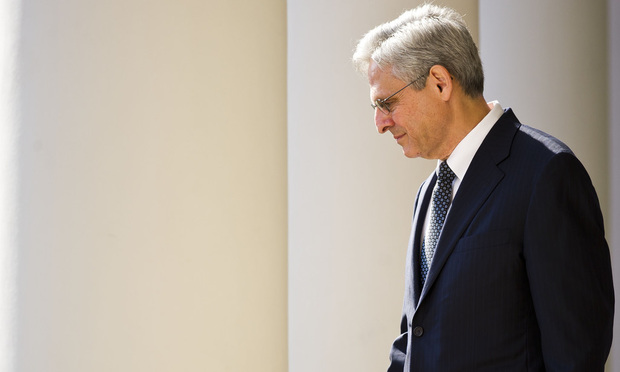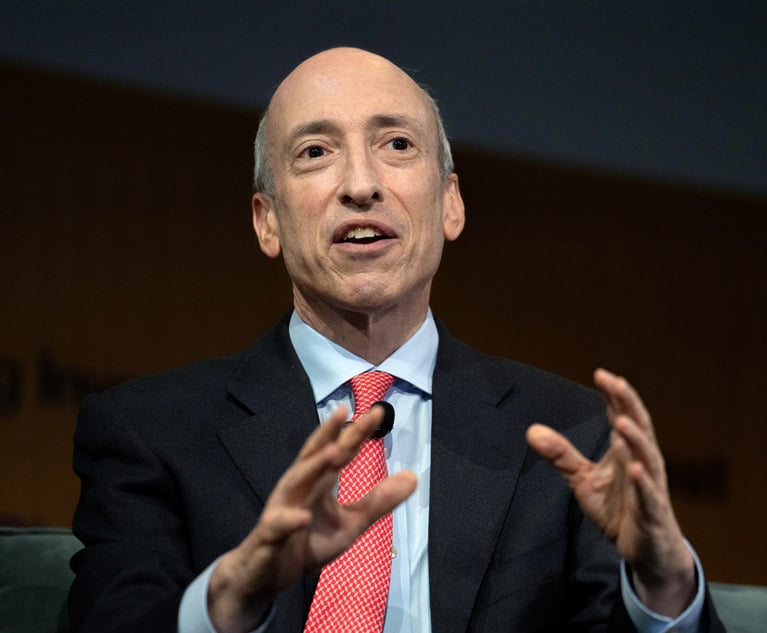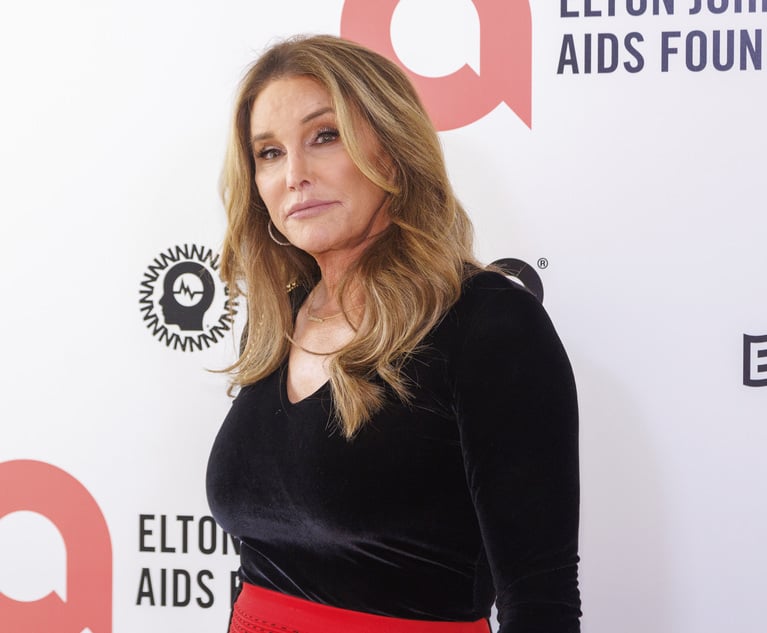How Merrick Garland Landed a Supreme Court Clerkship With Brennan
Warm letters between the late Justice Brennan and Merrick Garland were among a section of Brennan's papers at the Library of Congress that were closed to the public until last year, the 20th anniversary of his death.
March 26, 2018 at 03:15 PM
4 minute read
The original version of this story was published on National Law Journal
 Chief Judge Merrick Garland, of the U.S. Court of Appeals for the District of Columbia Circuit. Credit: Diego M. Radzinschi / NLJ
Chief Judge Merrick Garland, of the U.S. Court of Appeals for the District of Columbia Circuit. Credit: Diego M. Radzinschi / NLJ If the young Merrick Garland had not edited a law review article written by the late U.S. Supreme Court Justice William Brennan Jr. in 1977, he might not have clerked for Brennan and might have pursued a different path than the one that led him to be an appellate judge and Supreme Court nominee.
“Editing your article was enjoyable and exciting, and I would look forward to the prospect of clerking for an even more rewarding experience,” Garland wrote in a May 1977 application letter to Brennan, the liberal justice who died in 1997. The article was on the subject of state constitutions and the protection of individual rights. Garland, then at Harvard Law School, was articles editor for the law review.
Brennan wrote back swiftly, telling Garland, “I am delighted to have your application … Frankly, I was hoping you would apply. I am more than happy to offer you a clerkship with me for the 1978 term after you have successfully completed your clerkship with Judge [Henry] Friendly.” There was no indication Brennan wanted or needed to interview Garland as part of the hiring process.
The warm letters were among a section of Brennan's papers at the Library of Congress that were closed to the public until last year, the 20th anniversary of his death.
In April 2016, when Garland—now chief judge of the U.S. Court of Appeals for the D.C. Circuit—was a nominee for a seat on the U.S. Supreme Court, journalists tried to unearth his correspondence with Brennan.
But Brennan's executors declared the file off limits because of the 20th anniversary requirement. As mentioned last week in Supreme Court Brief, the anniversary came and went last July apparently without anyone mining the papers for information until recently. The Republican-led Senate did not act on Garland's nomination, which expired January 3, 2017, with the end of the 114th Congress.
The Garland file also includes Brennan's 1995 letter to President Bill Clinton urging him to consider Garland as a nominee to the D.C. Circuit. That letter, which was made public by the Clinton Presidential Library when Garland was still a Supreme Court nominee in 2016, praised Garland as “a person of exceptional talent and great personal integrity.” Brennan also wrote, “Ordinarily I would not inject myself into the judicial nomination process, but Merrick is a special case.”
After Garland's clerkship ended in 1979, Brennan also wrote letters of recommendation to then-deputy attorney general Benjamin Civiletti and the vice president's counsel Michael Berman. From 1979 to 1981, Garland served as a special assistant to the attorney general.
The file also contains the resume Garland submitted to Brennan, including his grades at Harvard Law School from 1974 to 1977. He received A+ grades for Constitutional Law, Federal Courts and Advanced Antitrust, an A in Criminal Law, and an A- in Civil Procedure. His lowest grade was a B in Due Process.
Read more:
The Select 75: A Portrait of Merrick Garland's Law Clerks
Inside Chambers: Merrick Garland and His 75 Law Clerks
In Clerkship Picks, Law Schools Want Garland to Share the Love
Brennan Papers: 'We Live and We Learn' | The Sides of March
This content has been archived. It is available through our partners, LexisNexis® and Bloomberg Law.
To view this content, please continue to their sites.
Not a Lexis Subscriber?
Subscribe Now
Not a Bloomberg Law Subscriber?
Subscribe Now
NOT FOR REPRINT
© 2025 ALM Global, LLC, All Rights Reserved. Request academic re-use from www.copyright.com. All other uses, submit a request to [email protected]. For more information visit Asset & Logo Licensing.
You Might Like
View All
Am Law 100 Partners on Trump’s Short List to Replace Gensler as SEC Chair
4 minute read

Trending Stories
- 1Ex-Starbucks GC Exiting Latest Role, Will Get Severance
- 2Family Law Special Section 2025
- 3We Must Uphold the Rights of Immigrant Students
- 4Orrick Picks Up 13-Lawyer Tech, VC Group From Gunderson Dettmer
- 5How Alzheimer’s and Other Cognitive Diseases Affect Guardianship, POAs and Estate Planning
Who Got The Work
J. Brugh Lower of Gibbons has entered an appearance for industrial equipment supplier Devco Corporation in a pending trademark infringement lawsuit. The suit, accusing the defendant of selling knock-off Graco products, was filed Dec. 18 in New Jersey District Court by Rivkin Radler on behalf of Graco Inc. and Graco Minnesota. The case, assigned to U.S. District Judge Zahid N. Quraishi, is 3:24-cv-11294, Graco Inc. et al v. Devco Corporation.
Who Got The Work
Rebecca Maller-Stein and Kent A. Yalowitz of Arnold & Porter Kaye Scholer have entered their appearances for Hanaco Venture Capital and its executives, Lior Prosor and David Frankel, in a pending securities lawsuit. The action, filed on Dec. 24 in New York Southern District Court by Zell, Aron & Co. on behalf of Goldeneye Advisors, accuses the defendants of negligently and fraudulently managing the plaintiff's $1 million investment. The case, assigned to U.S. District Judge Vernon S. Broderick, is 1:24-cv-09918, Goldeneye Advisors, LLC v. Hanaco Venture Capital, Ltd. et al.
Who Got The Work
Attorneys from A&O Shearman has stepped in as defense counsel for Toronto-Dominion Bank and other defendants in a pending securities class action. The suit, filed Dec. 11 in New York Southern District Court by Bleichmar Fonti & Auld, accuses the defendants of concealing the bank's 'pervasive' deficiencies in regards to its compliance with the Bank Secrecy Act and the quality of its anti-money laundering controls. The case, assigned to U.S. District Judge Arun Subramanian, is 1:24-cv-09445, Gonzalez v. The Toronto-Dominion Bank et al.
Who Got The Work
Crown Castle International, a Pennsylvania company providing shared communications infrastructure, has turned to Luke D. Wolf of Gordon Rees Scully Mansukhani to fend off a pending breach-of-contract lawsuit. The court action, filed Nov. 25 in Michigan Eastern District Court by Hooper Hathaway PC on behalf of The Town Residences LLC, accuses Crown Castle of failing to transfer approximately $30,000 in utility payments from T-Mobile in breach of a roof-top lease and assignment agreement. The case, assigned to U.S. District Judge Susan K. Declercq, is 2:24-cv-13131, The Town Residences LLC v. T-Mobile US, Inc. et al.
Who Got The Work
Wilfred P. Coronato and Daniel M. Schwartz of McCarter & English have stepped in as defense counsel to Electrolux Home Products Inc. in a pending product liability lawsuit. The court action, filed Nov. 26 in New York Eastern District Court by Poulos Lopiccolo PC and Nagel Rice LLP on behalf of David Stern, alleges that the defendant's refrigerators’ drawers and shelving repeatedly break and fall apart within months after purchase. The case, assigned to U.S. District Judge Joan M. Azrack, is 2:24-cv-08204, Stern v. Electrolux Home Products, Inc.
Featured Firms
Law Offices of Gary Martin Hays & Associates, P.C.
(470) 294-1674
Law Offices of Mark E. Salomone
(857) 444-6468
Smith & Hassler
(713) 739-1250









